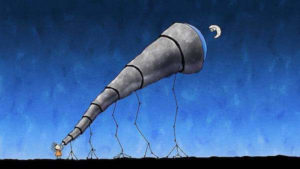Or: Nope. Just Nope.
 Seems that bad movie science is something we just have to live with. It's as if the writers spent thousands of hours, over years and years, learning to write instead of becoming scientists.
Seems that bad movie science is something we just have to live with. It's as if the writers spent thousands of hours, over years and years, learning to write instead of becoming scientists.
We can't forget the contributions of novelists, comic book writers, and videogame creators, but the film writers are the most visible ones.
A few of my favorites:
- Acid will dissolve solid objects: Not usually, no. Most acids are relatively weak and get used up as they react. There are “superacids” that do behave somewhat like movie acids, but they're so dangerous that we can't actually store them in anything except Teflon. And even superacids don't eat through metal as fast as movie acid (though fluoroantimonic acid comes close). Of course, if you're talking about eating through sponge or a person, that's another matter.
- Volcanoes can erupt at a moment's notice: Well, sure, if by “a moment's notice” you mean a matter of months. Scientists are getting pretty good at predicting eruptions—not to the point of pinning it down to a specific day or time, but they can usually give you a heads up that something is likely to happen weeks or months ahead. Also, a volcano definitely WON'T be forming in Los Angeles any time soon.
- Magic cures: Vaccines generally take years to develop. One guy certainly can't cook one up in a few hours.
- Diamond swords: Diamond may be the hardest naturally occurring material on Earth (other than Lonsdaleite, which is basically a diamond variant), but this does NOT mean that diamond would make a good material for a sword. While it is hard, diamond is also incredibly brittle and would probably break the first time you hit anything with it.
- Literally anything involving computer hackers: Hollywood hasn't the foggiest idea how computers work, far as I can tell.
- Movie fires are all smokeless: In real life, fires in an enclosed space produce so much smoke that you can't see a thing. Even a small fire in an oven will blind you completely with the smoke. Trust me on that one.
- Planets that only have one climate: Wouldn't actually work in real life. A planet with an atmosphere will always have different climates. There's an enormous list of reasons why, ranging from the obvious (temperature variations by latitude) to the obscure (lack of sufficient oxygen production in certain biomes, like deserts, to maintain a breathable atmosphere).
- Lasers that move at visible speeds: Nope. Just nope.
_________
Quotable
Oh, Yard Ramp Guy...are you star struck?
“When the legend becomes fact, print the legend.”
— from “The Man Who Shot Liberty Valance”




 Some science results in vital, society-altering work. Think about our creating vaccines, researching earthquakes, and discovering new construction materials.
Some science results in vital, society-altering work. Think about our creating vaccines, researching earthquakes, and discovering new construction materials. Realizing that if you attach a weighted stick to the rear end of a chicken, it then walks in the same way that dinosaurs were thought to have walked.
Realizing that if you attach a weighted stick to the rear end of a chicken, it then walks in the same way that dinosaurs were thought to have walked. The absurd science category sometimes becomes relevant: Sir Andre Geim won both the Ig Nobel Prize (he was the one to levitate the small frog with magnets) and the Nobel Prize for his work on graphene.
The absurd science category sometimes becomes relevant: Sir Andre Geim won both the Ig Nobel Prize (he was the one to levitate the small frog with magnets) and the Nobel Prize for his work on graphene.
